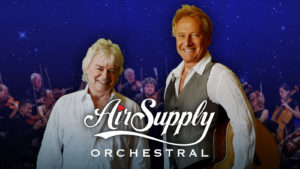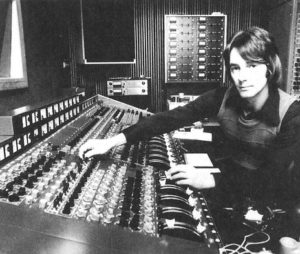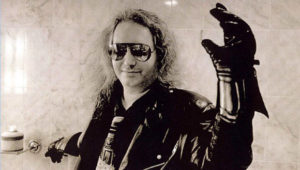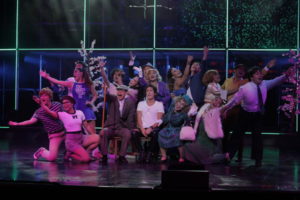Interview: Air Supply’s Graham Russell
During the late 70s and early 80s it was virtually impossible to turn on the radio and not hear Air Supply.
The Australian band’s brand of pop-rock connected with millions of fans, resulting in a string of hits that includes Lost In Love, All Out Of Love and their debut single, Love And Other Bruises, produced by Kiwi Peter Dawkins.
Yes, it was love songs, nothing but love songs, for Air Supply, but it has kept them going for over 40 years.
Vocalist Russell Hitchcock and guitarist/songwriter Graham Russell return to New Zealand on Tuesday, April 30th to Auckland’s Bruce Mason Centre to present Air Supply Orchestral.
The 13th Floor’s Marty Duda spoke to Graham Russell about the upcoming show and about the long list of fascinating characters Air Supply has worked with over the years.
Click here to listen to the interview:
Or, read a transcription of the interview here:
MD: You’re going to be here in Auckland in the end of April. And I believe you’re going to be playing with a 20-piece orchestra as well as your band, so is that something out of the ordinary? Or is that something you’ve been doing on a regular basis?
GR: We don’t do a lot of them, but this year we are doing a lot of symphony shows because our new record is with the Prague Symphony.
MD: Why did you choose the Prague Symphony? It seems to be one that people go to a lot.
GR: Well they are just such great players. They’re one of the best in Europe and I’ve always wanted to play with them. So, when the opportunity came up, we jumped at it, you know?
 MD: And so, the old tunes that everyone wants to hear, they’re pretty much kind of made for being heard with an orchestra anyway. Is there much tweaking that you have to do when you perform in this configuration?
MD: And so, the old tunes that everyone wants to hear, they’re pretty much kind of made for being heard with an orchestra anyway. Is there much tweaking that you have to do when you perform in this configuration?
GR: Ah, there is, yes. We record everything and then get back to the studio, it’s a long process just mixing everything. So, the great thing with the Prague Symphony – they’re such great players, they’re really accurate with their tuning. And they’re very precise, so there’s not a lot of tweaking you need to do, but there’s always some. You know what I mean?
MD: Right, yeah yeah. I was hoping to run through some moments in your extensive career and get some comments from you to kind of enlighten folks about who you guys are, if they don’t already know who you are – which they should.
GR: Yeah
MD: First of all, your first single, Love And Other Bruises, which was recorded back in ’76, you had Peter Dawkins producing who was a Kiwi of course, so we always want to hear about that. I was wondering if you had any memories of specifically working with him, what it was like and what he added to the mix there.

GR: Well, he really created that record. We already had the song and at that point we were very green and we really didn’t know what we were doing. We just had a great singer and we had some great songs but Peter really put it all together and we became really close friends. We did three albums with him. He was a great producer. He was probably the most famous producer in Australia at that time. He was producing a guy called Russ Ryan, he was very successful and when we were able to work with him we felt very fortunate and very lucky to have him and he created our, you know Love and other Bruises was a really big hit, so he really put our career on the map. He really gave us that initial thrust of suddenly everybody knew who we were pretty quickly.
MD: Did you choose to work with him? Was he assigned to you by the record company? How did it work?
GR: He was assigned to us. He’d just joined CBS Records in Australia. They were a brand-new company and they didn’t have any artists. So when we came along it was a great moment because they were looking for artists, we were looking for a record company and we’d been turned down by everybody else. So he said, I’m gonna give you guys a shot. He just loved the song, he said, “I think this song’s gonna be a hit.” And I thought, I think, it was a challenge for him because he was so popular at the time and it was a different kind of vibe. We are very well known for our big harmonies and big ballads and this was the first one, and I think it was a challenge that he wanted to take. And he did so well. It’s funny, when you hear it today, the record still sounds incredible. It’s just a great record.
MD: Now later on in your career, after you were back with Arista Records, you worked with David Foster. I’m curious as to kind of comparing the working method that he had compared to your earlier records.
GR: Well, David, we also became great friends with David. David is a real maestro. He’s a brilliant musician. Peter wasn’t a musician, so he came from a different angle. But David is a world class musician. He’s an incredible piano player. And he’s just great to work with. Everybody wants to work with him and it was a great opportunity. He’s just one of the greatest musicians and record producers of our generation.
MD: And did you find he was trying to put a particular sound to you. Or by that time your thing was your thing?
GR: He was. Yeah. He was. When we worked with him, he hadn’t really found his sound, so we became part of it. He knew us. We’d had several number ones already. So, we knew we were that epic, big ballad sound. And he just took it somewhere else, to another level. We actually wrote the song together, which ended up being nominated for a Grammy with him. So, it was great. It’s funny because in our career we’ve had, we’ve had the pleasure and the luck to work with great people, you know.
MD: Yeah, yeah. Another one of the people, in between the two is Clive Davis, who signed you guys to Arista in ’80 and you know, people have heard of him over and over again from his work on Columbia Records and signing Janis Joplin and whoever back in the ’60s all the way up until now and Whitney Houston and all that. I was just wondering what kind of interaction you had with him? What was the process? What did he see in you and how did he affect what you guys sounded like?
GR: Well, I remember meeting him the first time. And I knew who he was, but I didn’t know his real legend because he is a legend in the music business world-wide. But when I met him, he just said “You’ve got some great songs”. He said, “Go and make the album and we’re gonna have a lot of hits together.” And he was right, you know? He came in the studio and if he wanted to change a couple of things, which he did, we’d say “Okay, Sure” You know? And we got on really well with him. It was a partnership. And what he wanted on every record, he said “I want three Top 5 songs on every album, that’s what I want.” And that’s what we gave him. And he was great to work with. He really was.
MD: And did he give you a clear indication of the type of sound that he wanted? Or did he leave it up to you to kind of find your way as far as it goes?
GR: I think he left it up to us because Lost In Love had already arrived. He didn’t really have any input on Lost In Love so the sound was kind of beginning to be created but with all All Out of Love it… that was a little more epic and he had a lot to do with that. He said, “I just want it big.” And I’ve always loved the big orchestral sound, so we got on great. There was no fighting or anything like that. We just brought the songs and he said, “OK, Let’s go!” And he always told us, “This is going to go to Number 1. That’s gonna go.” And he was right every time.
MD: That’s amazing. Now another character that pops up in your history is Jim Steinman, because he wrote Making Love Out Of Nothing At All.
GR: Yeah.
MD: Did you just get the song from him, or did you actually work with him? He’s kind of known as an eccentric being of some sort.

GR: Yeah, he’s a little eccentric. You know, when we met him – it’s his song. And Clive actually brought the song and said, “Would you be interested in recording this song?” He thought it was a smash. And you know, I knew that Russell was going to be singing it because it was super high. And Russell loved the song straightaway, and so did I. And then the chance to work with Jim was a great one. But he is a little weird.
MD: In what way?
GR: But he was great. He just played piano and… We met him in New York at Rumplmeyer’s and we had ice cream together. And we cut the song. I said to him, “We gotta cut the song down a little.” It was like seven and half minutes. And it ended up being six minutes. And he said, “Yeah, no problem.” So we went in the studio and he said, “I’m gonna bring all the musicians in and we’re gonna do it.” And we did the whole thing in an afternoon. It was fabulous.
MD: That’s amazing.
GR: Of course Russell sang it in one take. And that was it.
MD: Speaking of Russell. How is the relationship – how has it changed? How has it stayed the same over the years? You guys have been together since like 1975 and that’s a long time.
GR: Yeah. You know – we’ve never had an argument and we’re very proud of that. We’ve never had a cross word. I think because I have great respect for him. I’ve always believed he’s one of the greatest singers of our generation and he just comes in the studio. He doesn’t get involved in the songs. He comes in and he sings. And he usually sings it one or two takes and then that’s it and he’s done. So, he leaves all the other stuff to me. You know, he lets me write the songs and produce the albums. And I’m fine with that. So we get on great. He’s just a wonderful, sensitive human being, he really is.
MD: Now one of the things that’s happened recently is your song, All Out Of Love got used in Deadpool 2, the film. And I’m wondering what kind of impact that has on your career, when something like that – it seems from an outsider’s point of view – it seems like something completely out of the blue happens like that.
GR: Yeah, well it’s funny cos it keeps you in the public eye and you know, All Out Of Love has been in, I think, fifteen movies already. And there’s another one coming out too. We’ve always had songs in movies that have kept us visible. And not just visible, but very visible. Like coming up there’s a big TV show in the United States called The Bachelor. I don’t know if you get it in New Zealand.
MD: Yeah, I think we do.
GR: But we’re going to play on the final season of that. And it’s got an audience of 25 million, so that’ll keep us… You know, we just have these things that keep us in the public eye. And it’s not by design. People come to us and they say, “Would you do this? Will you do that? Can I have this song? You know?” And we say, yeah, sure.
MD: The other thing that’s happened is there’s been Jukebox Musical, written and based around the music of Air Supply that was, I think it came from the Philippines, is that right?
 GR: Yeah. We went for the opening night. Actually, the show was really really good. We were very surprised. We didn’t know what it was going to be like. They asked me to write a new song for it, which I did. And it was a fabulous show. And I think it’s going to go all around Asia before coming to the US or other places.
GR: Yeah. We went for the opening night. Actually, the show was really really good. We were very surprised. We didn’t know what it was going to be like. They asked me to write a new song for it, which I did. And it was a fabulous show. And I think it’s going to go all around Asia before coming to the US or other places.
MD: Right. What did you think when you were watching it? It must be kind of bizarre to be sitting there watching your career being sung back at you?
GR: Yeah, it was very unusual. But we were excited about it. And we both said, “It’s time. We’ve had a long career, we’ve got some great songs that have been the soundtrack to people’s lives all over the world. So it seemed appropriate. But we were very pleased that it was a great show. And it sounded great. So we were very happy about that. It was like another step in our career.
MD: Yeah, that’s pretty exciting. And one thing I realised when I was doing a little research that several of the members of the band, back in the late ’70s, early ’80s went on to form The Divinyls, which is another iconic Australian band, completely different from what you guys are doing. Do you feel any affinity with the rest of that kind of scene? I’m just curious.
GR: You know, not really. I mean, we keep in touch with Jeremy (Paul), but we don’t really have much time to keep in touch with anything. I mean, Air Supply is an entity that takes all our time and every ounce of energy because there’s so much going on all the time. Like I said, we leave again tomorrow and we do so many shows. We do 130 shows a year, so we don’t get time to virtually take time off. We really don’t get that time.
Click here to see Air Supply Orchestral at Bruce Mason Centre.
- New Music Friday: 13th Floor New Album Picks: April 26, 2024 - April 26, 2024
- Psycho Gab Perform Gabben at The 13th Floor: Singles Session - April 26, 2024
- Anna Coddington – Kātuarehe: 13th Floor New Song Of The Day - April 26, 2024
